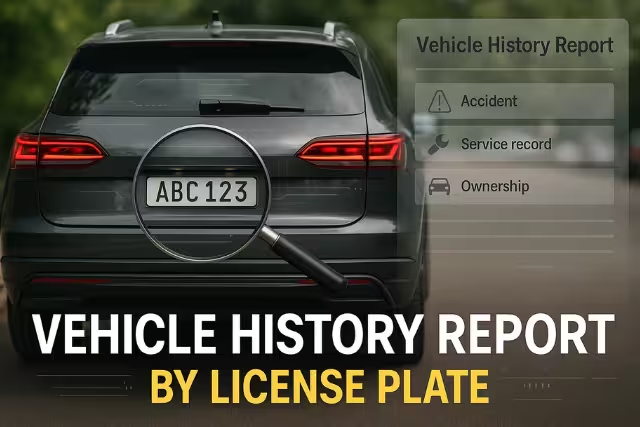When buying a used vehicle, it is best to find out about the car’s past before deciding. Most customers pay attention to looks and engine performance on a test run, but that’s only half the picture.
This kind of report discloses critical information about the history of a car, such as accidents, title problems, registration history, and even theft. Buying from a private seller, dealership, or online auction, the vehicle history report by license plate can protect you from costly errors.
By getting your hands on these details ahead of time, you’re in a better position to negotiate a decent price and stay away from vehicles with secrets. Throughout this comprehensive guide, we’ll outline what you can discover in these reports, how to get one, and why it is important.
What Details Can You Find in a License Plate Vehicle History Report?
A vehicle history report by license plate is an extensive report with important information about a car’s history. It’s particularly valuable if the seller lacks full documentation or refuses to provide the entire history of the vehicle.
You can generally expect to locate the following in this report:
- Accident History: Histories of prior crashes, severity of damage, airbag deployments, and structural repairs.
- Title History: Notices on whether the vehicle has been given a salvage, rebuilt, or junk title, showing extreme previous damage.
- Ownership: Number of owners in the past, their hometown, and the length of ownership.
- Odometer Readings: Records of mileage that have been compiled during inspections, services, and title transfers.
- Service and Maintenance Records: Routine servicing, repairs, and recalls are covered.
- Theft Reports: To check if the vehicle has ever been stolen and if it was recovered or not.
As an initial review, most services provide a free vehicle history report by plate number, with basic title and registration information, without charging you. This may be a good place to start before laying out money for a complete report.
Another valuable feature is the ability to verify whether a license plate matches the actual vehicle’s VIN. Mismatches might indicate illegal modifications or even vehicle cloning. Confirming this through a vehicle history report by license plate number ensures the car you’re considering is legally registered.
How to Get a Vehicle History Report by License Plate? Step-by-step process!
If you’re still uncertain where to begin, check out this simple guide to requesting a vehicle history report by plate number:
Step 1: Note down the complete license plate number.
You should write down the license plate number on the vehicle first, and check it afterwards to ensure you have the right plate number, so you don’t get the wrong report.
Step 2: Find the VIN for Cross-Reference
The VIN of the vehicle can be located on the registration documents, driver’s side door frame, or dashboard. A legitimate vehicle history report by license plate number should cross-match the plate and VIN for authenticity assurance.
Step 3: Utilize a Government or Reliable Internet Portal
Visit your state’s Department of Motor Vehicles site or an approved vehicle records provider. Type the license plate number into the search box to order the vehicle history report by license plate.
Step 4: Check Important Sections for Important Details
Review reports of accidents, title changes, mileage history, and transfers of ownership. A free vehicle history report by license plate may be available on some sites for a summary and paid requests for detailed records.
Step 5: Download and Print the Complete Report for Future Reference
After examining the findings, it’s a good idea to download or print the report for future reference. It is useful during negotiations or in case of any issues after the purchase.
Benefits of Checking vehicle history report by license plate number
There are several advantages of looking into a vehicle history report by license plate number before purchasing any used vehicle:
- Eliminate Unexpected Problems: These reports reveal problems that may be unseen, such as hidden flood damage, catastrophic accidents, or issues with the title.
- Insurance against Fraud: If the plate matches the VIN, then you can verify that the car is not reported stolen, cloned, or has hidden changes.
- Confirm Owner’s History: If the car has had 3 owners and you see that it has averaged around 5 months per owner, it means you have information on whether or not the car is reliable, and probably never received care.
- Find Recalls: The report can indicate whether the car has manufacturer recalls pending that have not been fulfilled.
- Take Advantage of a Free Vehicle History Report by License Plate for a Quick Check: Simple free reports can provide you with a rough sense of a vehicle’s history without added expense.
This step keeps your investment and personal safety in check, particularly with unknown sellers.
Tips to Verify a License Plate Report Before Buying
Though a license plate vehicle history report is very beneficial, it’s always advisable to cross-check the information. Here’s why:
Compare VIN and License Plate Numbers
Verify the VIN reported in the report is correct for the vehicle and in its documents. Inconsistency is a red flag.
Check for Title Labels
In the event that the vehicle history report by plate number shows a salvage, rebuilt, or flood damage title, take caution before going further. These titles imply that the vehicle has undergone major damage.
Check for Mileage Accuracy
Odometer readings should increase progressively with time. Unexplained drops in mileage or large gaps in the history of mileage, as indicated in the vehicle history report by tag number, may indicate tampering.
Scan for Serious Accidents
A single serious accident might affect the long-term value and safety of the car. Always check whether or not the report mentions frame or airbag damage.
Verify the Registration and Ownership Timeline
Check the registration and change of ownership dates. Repeated changes in ownership over a short time frame may be a sign of mechanical trouble or legal issues.
Frequently Asked Questions (FAQ’s)
1. What data can you obtain from a license plate history report?
A license plate history report contains accident history, title changes, mileage readings, theft notices, and ownership changes associated with the vehicle.
2. Is there a way to obtain a free vehicle history report by license plate?
Yes — certain services provide a free vehicle history report by license plate for simple information such as registration history and title status.
3. Why is it necessary to check a vehicle history report by license plate number?
It will save you from purchasing a vehicle with underlying issues like past wrecks, theft, or unsettled recalls.
4. How reliable are online license plate vehicle reports?
Official DMV or authorized database reports are usually accurate since they derive the data from government and insurance records directly.
5. Can you run a vehicle’s history with just its license plate?
Yes — a number of official services enable you to search public records with only the plate number to get ownership, title, and accident history.
Don’t make a blind purchase—run a license plate history check now. Get instant access to accident records, ownership history, and more today! Learn more with AutoMagToday.


